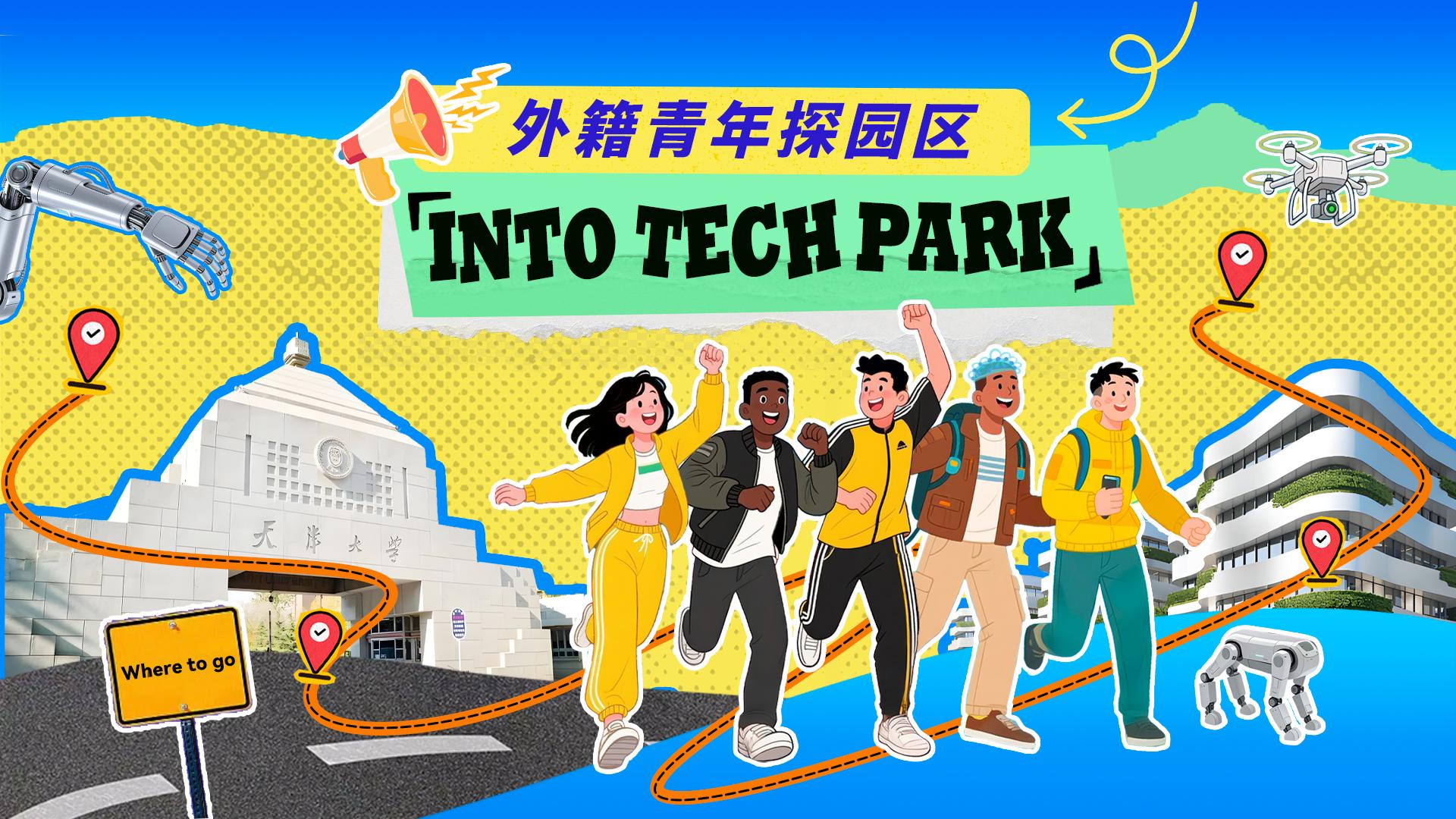Into Tech Park: Zooming In on China's Innovative Spirit

Editor's Note:
This article offers a fresh perspective on China's innovation landscape through the eyes of five young international researchers. Their immersive journey through high-tech zones in Beijing's neighboring Tianjin city, renowned educational institutions and entrepreneurial bases for overseas talent reveals a dynamic China that blends tradition with modernity, and openness and local character with global vision. Part of our "Into Tech Park" series, this edition brings you youth-driven insights into what makes China's innovation ecosystem unique.
Imagine controlling objects with your mind, like a Marvel Comic superhero. In Tianjin, this fantasy is becoming reality. Picture Osuagwu Obinna Ikechukwu, a young Nigerian researcher at the University of Chinese Academy of Sciences (UCAS), wearing a headset connected to a wearable "backpack," attempting to lift a bottle using only his thoughts. With the help of a futuristic "sixth finger" device developed by Tianjin University (TJU)'s Brain-Computer Interaction and Human-Machine Integration team, he succeeded. "Amazing!" he exclaimed, a sentiment echoed by four other international researchers on this unforgettable journey.
Hosted by S&T Daily, this week-long expedition was a deep dive into China's innovation ecosystem and cultural heritage. The group of young international innovators explored how China at large is embracing the future through science, technology and global collaboration.
Hard tech: the future has arrived
Tianjin's high-tech zones embody China's vision for a smarter, greener and more connected world. At the heart of this innovation engine is TJU, one of the powerhouses of talent and research.
TJU's close collaboration with the high-tech zones fosters breakthroughs in research, innovation and industrial development. The university supplies academic expertise and talent, while the zones provide real-world applications and commercialization opportunities.
At TJU Medical School, for example, the students experienced revolutionary non-invasive brain-computer interface technology. Meanwhile, at the School of Marine Science and Technology, they navigated a ship-handling simulator replicating real-world navigation conditions and complete with dynamic weather and sea environments. Timothy Hutagaol, an Indonesian student at TJU, was particularly impressed by the ASEAN-China Marine Education Big Data Platform, a digital tool enhancing regional cooperation.
"What fascinates me about China is how deeply technology is integrated into everyday life — in every sector, you see it fully implemented," Timothy said.
But innovation in Tianjin isn't confined to labs. The journey also revealed a seamless blend of culture and technology. Kazakh student Akbayan Yerlankyzy from UCAS, an architecture enthusiast, was captivated by traditional design principles at the TJU Institute of Architectural History and Heritage Conservation.
The group participated in a hands-on workshop assembling wooden structures using ancient techniques, including the iconic dougong, interlocking brackets that define classical Chinese architecture. "This activity showed us the harmony between structure, aesthetics and tradition," Obinna said.
For TJU student Song Ziyan, the exchange highlighted technology's role in preserving heritage. "I didn't expect foreign students to be so passionate about this field. Their curiosity embodies the spirit of people-to-people exchange," Song said.
However, as young French researcher Theo Yossa at UCAS noted, "Many French people recognize China's technological advancement but may not fully grasp its depth in certain areas. Better information sharing could enhance cooperation and mutual awareness."
This sentiment aligns with China's commitment to openness. A prime example is Danfoss, a leading Danish heating technology company, which made its first investment in China in 1996 by establishing Danfoss (Tianjin) Co., Ltd. After over two decades, the subsidiary has developed into a modern factory integrating research and development and intelligent manufacturing. Here, cutting-edge automation meets sustainability, proving that Industry 4.0 is a tangible force driving efficiency and environmental responsibility.
Soft environment: where ideas grow
But innovation doesn't happen in a vacuum. The soft environment, like supportive policies, infrastructure and a culture of entrepreneurship, is just as important. That's where places like the National Offshore Entrepreneurial Base for Overseas Professionals come in. Designed to welcome international startups, it provides the tools, mentorship and networks needed to turn ideas into scalable businesses.
At the base, Moaaz Awan from Pakistan was intrigued by the streamlined process for obtaining China's Permanent Residence Card. "If you meet residency and employment requirements, applying for permanent residence becomes a major incentive for long-term stays," he said.
A young entrepreneur, Richard Gao, who returned to China from France to launch his startup, emphasized the base's value: "It connects research institutions, universities and companies, as a one-stop solution for businesses."
These young innovators were impressed by the fertile environment provided by the base and China. They said China offers subsidized offices, business expense support, and even seed funding for strong projects. These are excellent examples of practical incentives.
For those who witness China's development course, its openness isn't just rhetoric. "Cities like Tianjin, Beijing and Guangzhou each offer unique policy experiments," Awan observed. "This mix-and-match approach helps businesses find their ideal ecosystem."
A recent milestone in the Tianjin tech world is the launch of the city's first fully foreign-owned hospital by a Singaporean group. "While not all sectors are fully open, the trend is clear," Awan said. "This is the time to seize opportunities and share them globally."
At the same time, the Peking University Entrepreneurship Camp in Tianjin showcases how academia and industry collaborate to accelerate intelligent technologies, from AI to robotics. Meanwhile, at Assure Power Technology (Tianjin), a company incubated in the camp, the research team shared their breakthrough in low-wind turbine technology, an innovation supporting China's clean energy goals and opening doors for global partnerships, particularly with countries like Indonesia.
"This experience proved green energy isn't just a scientific challenge," Obinna concluded. "It's a bridge for worldwide sustainability collaboration."
Planned by WANG Junming, FENG Weidong, HE Yi, FANG Linlin & CHEN Xi
Written by ZHONG Jianli & LONG Yun
Edited by GONG Qian & LU Zijian
YIN Wei from TJU also contributed to this article.






